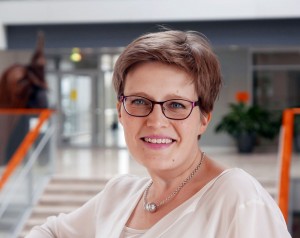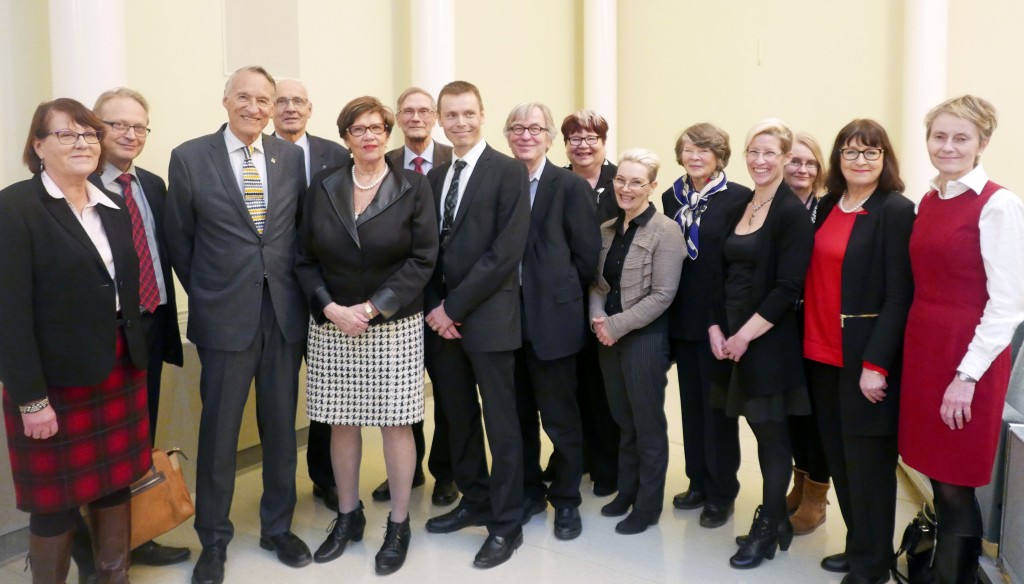Working side by side
 I assumed the position of head of administration at the Faculty of Veterinary Medicine in March 2015, succeeding Maija Halme, who retired after an impressive career at the Faculty. Coming from Central Administration, the University was a familiar working environment for me, but veterinary medicine as a discipline and field of education was new to me. Fortunately, with the new job came awesome new colleagues, who have not spared themselves in advising, helping and supporting me in my duties.
I assumed the position of head of administration at the Faculty of Veterinary Medicine in March 2015, succeeding Maija Halme, who retired after an impressive career at the Faculty. Coming from Central Administration, the University was a familiar working environment for me, but veterinary medicine as a discipline and field of education was new to me. Fortunately, with the new job came awesome new colleagues, who have not spared themselves in advising, helping and supporting me in my duties.
Before beginning my new job, I had the opportunity to participate in the annual Faculty Day. The 2015 annual Faculty Day was held in the Small Hall of the University’s Main Building. In this event, a chronicle to celebrate the Faculty’s 20th anniversary was published (book in Finnish). Besides the Faculty staff, numerous contributors to the chronicle and the Faculty’s first 20 years were present, including MP Sirkka-Liisa Anttila, former Director of the University of Helsinki Technical Department Toivo Vainiotalo, Professor Emeritus Risto Ihamuotila, Library Councilor Teodora Oker-Blom and Head of Korkeasaari Zoo Sanna Hellström.

Most of the 20-year memory book authors, from the left: Terttu Katila, Antti Sukura, Risto Ihamuotila, Toivo Vainiotalo, Sirkka-Liisa Anttila, Hannu Saloniemi, Olli Peltoniemi, Hannu Korkeala, Maija Halme, Mirja Ruohoniemi, Teodora Oker-Blom, Sanna Hellström, Sanna Ryhänen, Airi Palva and Outi Vapaavuori.
The Faculty celebrated its 20th anniversary in a relaxed manner among personnel in April. The program included many activities such as faculty bingo, student association EKY’s mini improvisations, karaoke, mindfulness sessions and games for fun. Micke & Lefty -band played the night away.
Right from the beginning, I was impressed by the degree of commitment among the Faculty’s staff in working towards common goals. I have discovered that the Faculty’s administrative staff are as highly committed to the discipline and the Faculty as the academics. The successes achieved at the Faculty are regarded as common successes – not only the departments, but also the Faculty Office is thrilled about the positive publicity received by the work of the Faculty’s researchers and about the good results obtained in the Bachelor’s Graduate Survey. Amongst the current turmoil at the University at large, it has been reassuring to observe the collegial spirit and support that marks the Faculty’s activities.
The Faculty’s mission is closely connected to the University’s core duties of teaching and research. A close-up view of these activities also allows administrators to observe the effect of their work on teaching and research. Everyone knows everyone and feels responsible for the smooth running of the Faculty’s affairs, especially now that the University’s recruitment freeze and the cooperation procedure launched in 2015 mean that work must get done with diminishing resources. Administration also has made extra efforts to ensure the seamless continuity of the Faculty’s activities. The recruitment freeze was concretely felt at the Faculty when we were denied permission to hire a replacement for our postgraduate planning officer. With administrative resources already pruned down to the minimum, such decisions mean that some staff member or members must go the extra mile with a heavier workload. So far we have been able to cope, but in the long run such arrangements place too heavy a burden on the staff.
In administration, we continuously consider how our work can further the Faculty’s objectives, how useful some procedures are and how they add to the workload of teachers and researchers. I have felt that the administrative staff are an important part of the Faculty and that the work community appreciates our contribution. In future, we must ensure in every possible way that this fruitful cooperation and mutual respect persist, as the administrative staff transfers to the University’s new service organisation. The best way to do this, in my mind, is to maintain the current active interaction between the administrative and non-administrative staff. Radical changes impact wellbeing at work, and occupational wellbeing is affected by a number of factors, including the meaningfulness of one’s work, professional competence and control over one’s duties, and leadership, as well as trust and opportunities to make a difference. In the autumn of 2015, the University conducted a workplace wellbeing survey. Responses were collected almost immediately after the University had announced the upcoming cooperation negotiations. The responses gave no indication in our Faculty, or in any other faculty, that the cooperation negotiations would have visibly affected wellbeing at work at that stage. However, it is only natural that staff cuts, concern over one’s own and our colleagues’ jobs and increasing workloads will affect workplace wellbeing at some point. It is vitally important that we also remember to invest in workplace wellbeing even when finances are tight.
Elina Tuisku
Head of Administration
Faculty of Veterinary Medicine
University of Helsinki